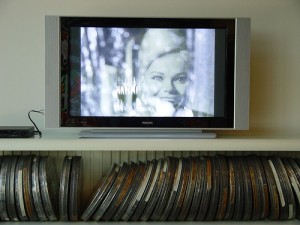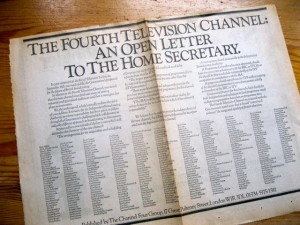-
Comperes and Cult Cinema: Moviedrome Remembered
In examining the contribution of Channel 4 (and, by extension, television as a whole) to British film culture, this project has a broad remit, which includes the institutional processes of film buying, programming and scheduling. Before the era of file sharing and Lovefilm, those people for whom the local Odeon had little to offer constantly […]
-

TV & Cinema Relations: The Cold War Era
With the recently published Film Policy Review advocating greater investment in film on the part of broadcasters (see Variety), it seems like a good opportunity to take a look back at the history of cinema/TV relations, starting with the 1950s. This was an era in which the medium of television was in its ascendancy. The […]
-

For Want of a Cultural Film Policy
Ahead of a visit to Pinewood Studios today, David Cameron has said that the film industry should support “commercially successful pictures”, in an attempt to prejudge the findings of Lord Smith’s review into the Government’s film policy, due out on Monday. To quote Mike Wayne (writing in 2002 in the print-defunct magazine Filmwaves, which has […]
-

The film of the TV series
With the critical and box-office success of Tomas Alfredson’s Tinker, Tailor, Soldier, Spy (which is currently occupying the top position at the British box-office), the trend of creating film adaptations of television mini-series looks set to continue. Tinker, Tailor has, of course, consistently been measured against Arthur Hopcraft’s distillation of the John le Carré novel, […]
-

Page Eight and the ‘newsworthiness’ of film on TV
David Hare’s Page Eight, which premiered at the Edinburgh Film Festival (on 18th June) before being shown soon after on BBC2 (28th August), presents us with the opportunity of looking at some aspects of television’s role in commissioning feature-length film that has the option of theatrical exhibition, partly using Hare’s own, frequently vented, opinions on […]
-

Emerging talent (Part 1)
In the wake of the interest around Film4 productions such as Richard Ayoade’s Submarine and Joe Cornish’s Attack the Block, a recent Guardian article by Jane Graham identifies what she sees as a trend of innovative films made by “industry outsiders with little or no formal training [in filmmaking]”. According to Graham, the forays of […]
-

The Future of Film
Are these ‘glorious’ times for the British film industry? At a recent debate at Goldsmiths College on the 3rd of February 2011, four panellists lined up to discuss this motion. Producer Robert Jones and Head of BBC Films Christine Langan argued for the ongoing success of the British film industry, while David Livingston of Working […]
-

Channel 4, British Film Culture and me
In November 1982 I was working as Assistant TV Acquisitions Officer in the National Film Archive at the British Film Institute and freelancing for Time Out and a range of magazines and newspapers about film and TV. I hadn’t been involved in any of the lobbying for the new channel, but awaited it with some […]
-

An Open Letter to the Home Secretary
On the desk in front of me as I as write is a half-page advertisement from The Times of 10 October 1979. This treasured clipping, now creased and yellowing, is headed ‘The Fourth Television Channel: An Open Letter to the Home Secretary’. Below a block of italicised text there is a signature list of more than […]
-

FACE TO FACE: Justin Smith talks to Jeremy Isaacs
JS: Aside from your established track record in television, you’d done a stint as Head of the BFI Production Board in the late 1970s. Was film always a personal passion? What were your reasons for making it a part of your declared manifesto for the new fourth channel? JI: Well, there was an argument going […]
 Learning on Screen
Learning on Screen